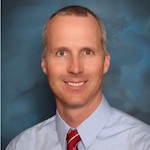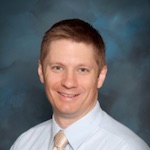For 40 years, Idaho Emergency Physicians (IEP) has been a leader in Boise's medical community. So when healthcare reform brought new challenges, this democratic partnership was eager to help the Saint Alphonsus Health System meet them. In today's post, Partners Luke Morris, DO, and Christopher Wyatt, MD, discuss the group's decision to
merge with Vituity.
Tell us a little about your group.Morris: We were founded in 1974 and grew to become one of the largest, longest-running physician groups in Idaho. We currently have about 40 physicians and 10 advanced providers. We serve the Saint Alphonsus Health System, which includes a Level 2 Trauma Center, cardiac center, and stroke center as well as other affiliated community EDs.
Being involved with our community has always been important to us. We run grand rounds and a journal club and include Saint Alphonsus providers, our medical staff colleagues, and our EMS and fire services. In the past, we've consulted with EDs across Oregon and Idaho via our telehealth program. And we also serve as medical directors for many of our local emergency and crisis response services.
Wyatt: IEP was a very high-functioning group with a great reputation. But as healthcare reform ramped up, we faced increasing pressures on multiple fronts: the hospital, the insurance companies, the government — and even from patients.
What did this mean for your group? Morris: We’d always maintained a good relationship with the Saint Alphonsus administrators. We saw they had a lot of demands on them — not just from the local administration but also from their parent company. And we realized that in order to be an effective partner, we needed to access more resources.
Wyatt: Although we were a large group, we didn’t have much bandwidth to research new business ideas or problem-solve systemic issues. We kind of became victims of the changing environment — always in reaction mode and never able to get ahead. No matter what we did, it looked like we were going to get paid less to do more.
To be a premier kind of group, we knew we’d have to make some changes. So we started brainstorming where we wanted to be in 10 years and looking at different management options.
What solutions did you consider?Wyatt: To be honest, joining Vituity — or any large group — wasn’t on the table at first. We looked at internal restructuring or bringing a business executive into the leadership. But we very much wanted to remain an independent group.
Morris: Historically, our group has always been fiercely independent. And there was a feeling that if we played our cards wrong, we could lose it all — our autonomy, our identity, and our reputation. And that was scary, because we're not clock punchers by any stretch of the imagination. We're here to make a real difference for our health system and community.
Wyatt: We received offers from private equity groups to buy part or all of IEP. And we would have made a lot of money in the short term. But it would have destroyed our culture, and most likely, our desire to work here. We'd have been led not by physicians but by business executives and shareholders. That wasn't the direction we wanted to go.
What brought you to Vituity?Wyatt: One of our partners met Jay Kaplan, MD, at an ACEP meeting. He was a Vice President at Vituity and president of ACEP. So our board had a call with him to get his perspective.
To be honest, we were just a little nervous he might pressure us to join
his group. But instead, he gave us some great guidance, pointing out areas we needed to be aware of and showing us where healthcare was headed. I honestly don’t think he brought up Vituity once, which was kind of refreshing.
Morris: One reason why Vituity began to appeal to us was because so many of its values resonated with IEP's values. Like us, they had democratic governance and strong local leadership.
Wyatt: Vituity's big idea was that if you focused on great patient care, the business piece would naturally follow. We really hadn’t seen that anywhere else. Not that the business aspect isn't important. Every group likes to get paid and keep its contracts. But I think that's one of the key differences between a physician-led group and a corporate management group.
Morris: Having physicians at the helm keeps priorities straight. We liked that
Vituity was 100 percent physician-run and physician-directed with zero venture capital invested. And they also have a great medical services organization that was working in the background to help the providers execute their vision.
Wyatt: Ultimately, I want to spend my whole career here. I think most of us do. And of all the options we looked at,
Vituity was the one I felt confident would still be working for us 20 years down the road. That's what decided it for me.
Vituity's big idea was that if you focused on great patient care, the business piece would naturally follow. We really hadn’t seen that anywhere else.
Still, I understand you had some convincing to do.Wyatt: When our board invited the
Vituity leadership to Boise, some of our partners were angry. They accused us of inviting the fox into the henhouse.
I think the
Vituity executives picked up on this. So they said, before we sign a contract, you really need to know exactly who we are. And they invited us to attend their annual Partnership Meeting and some of their regional meetings.
I attended one of those meetings, and one thing I found very telling was the way their partners interacted between the sessions. They’re a very optimistic, energetic group of people, and they seemed very sincere about doing the right thing for patients and one another. I felt their culture was consistent with the messages we'd been hearing.
And wouldn’t you know it, after that meeting, some of their most vocal opponents became their most vocal champions. They came back and said,
this is the one.I know its still early, but how are things going since you joined Vituity?Morris: Being a great partner for our hospital has always been a focus of ours, and we can already see how
Vituity is going to help us deliver more for them. They're innovating in some areas like telehealth and emergency psychiatry that are also very applicable to Saint Alphonsus. And of course we have the benefit of practice management consultants from the national office, who help us tailor those solutions to our EDs.
Wyatt: Now, if we have a question, we just send it up the flagpole. And within a day or two, we have experts from
Vituity telling us, here are your options. Here’s what’s worked at other locations. So we spend more time utilizing our skill sets as physicians and less time reinventing the wheel. It's like we’re back on offense.
Morris: I think the hospitals recognize this change as a positive one. One of our hospital CEOs in particular has researched
Vituity’s profile. When we talk about it, he seems very complimentary and excited.
Wyatt: Although we’ve always provided great medical care, we need to do more than that.
Vituity has showed us that although we were very good, we can always get better. We need to get better. And now we have the resources to do that.























